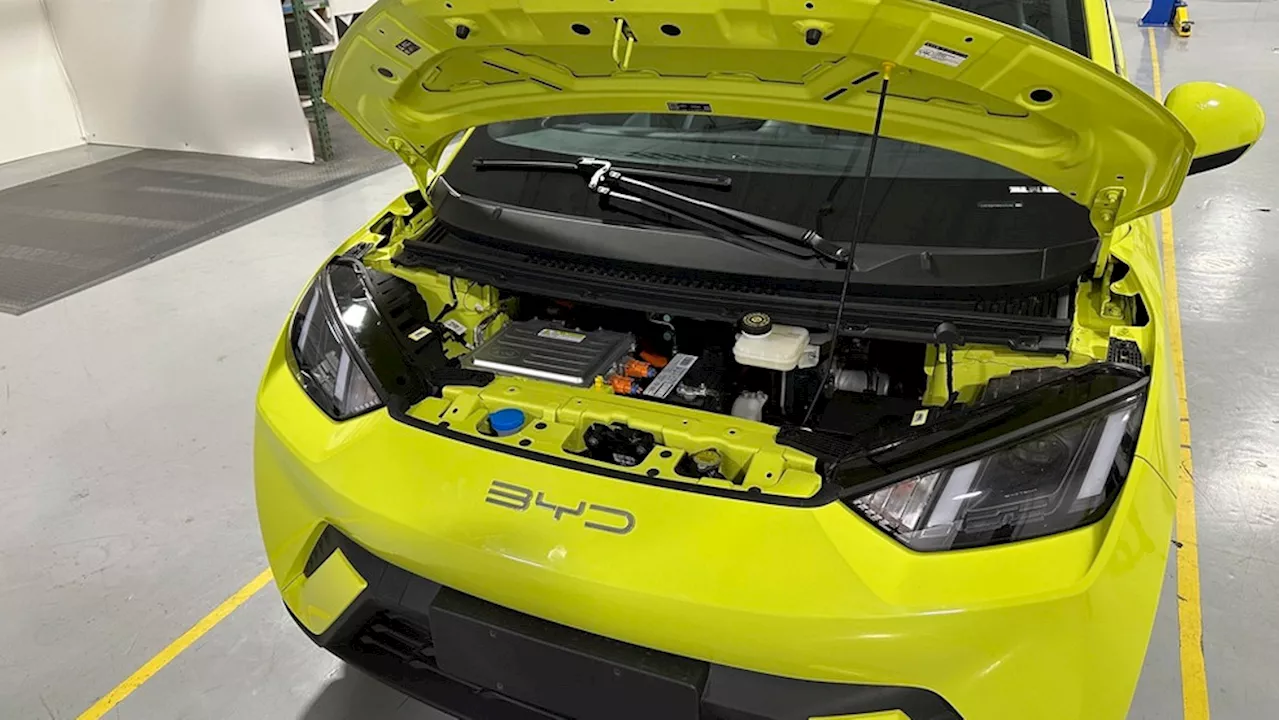The trade deal that Beijing could potentially exploit — the U.S.-Mexico-Canada Agreement — was negotiated by the Trump administration and enacted in 2020.
FILE - A BYD Seagull electric vehicle, with its hood open, is shown at the Caresoft Global facility April 3, 2024, in Livonia, Mich. China's BYD last year introduced the Seagull, a small EV that sells for just $12,000 in China. Chinese carmakers set up shop in Mexico to exploit North American trade rules. Once in place, they send ultra-low-priced electric vehicles streaming into the United States.
The trade deal that Beijing could potentially exploit — the U.S.-Mexico-Canada Agreement — was negotiated by the Trump administration and enacted in 2020. Its rules could let Chinese autos assembled in Mexico enter the United States, either duty-free or at a nominal 2.5% tariff rate. Either way, China could sell its EVs well below typical U.S. prices.
The threat from Beijing is emerging just as U.S. automakers face slowing EV sales even while investing billions to produce them in a high-priced bet that Americans will embrace battery-powered autos in the coming decades. Comparatively high prices, despite federal tax incentives for buyers, have weakened EV sales in the United States.
Critics note that BYD and other Chinese EV makers have achieved their cost efficiencies thanks to heavy government subsidies. Beijing spent 953 billion Chinese renminbi on EVs and other green vehicles from 2009 through 2021, according to researchers at the Center for Strategic and International Studies.Last month, Biden drastically raised the tariff on Chinese EVs, from the 27.5% established under Trump to 102.5%. It's meant to price even the bargain-priced BYD Seagull out of the U.S.
But there's an easier way that Chinese EV makers could use Mexico to try to dodge Biden's killer 102.5% import tax: They would have to pay only 2.5% — the tax imposed on most cars imported to the United States — if they could show that assembling their EVs in Mexico involved a "substantial transformation'' that essentially turned them from Chinese into Mexican cars.
"U.S. fears regarding possible use of connected vehicles to spy on military installations or powerplants are not irrational,'' Gantz wrote.
US Auto Industry Mexico Tariffs USMCA Trade Subsidies National Security
United States Latest News, United States Headlines
Similar News:You can also read news stories similar to this one that we have collected from other news sources.
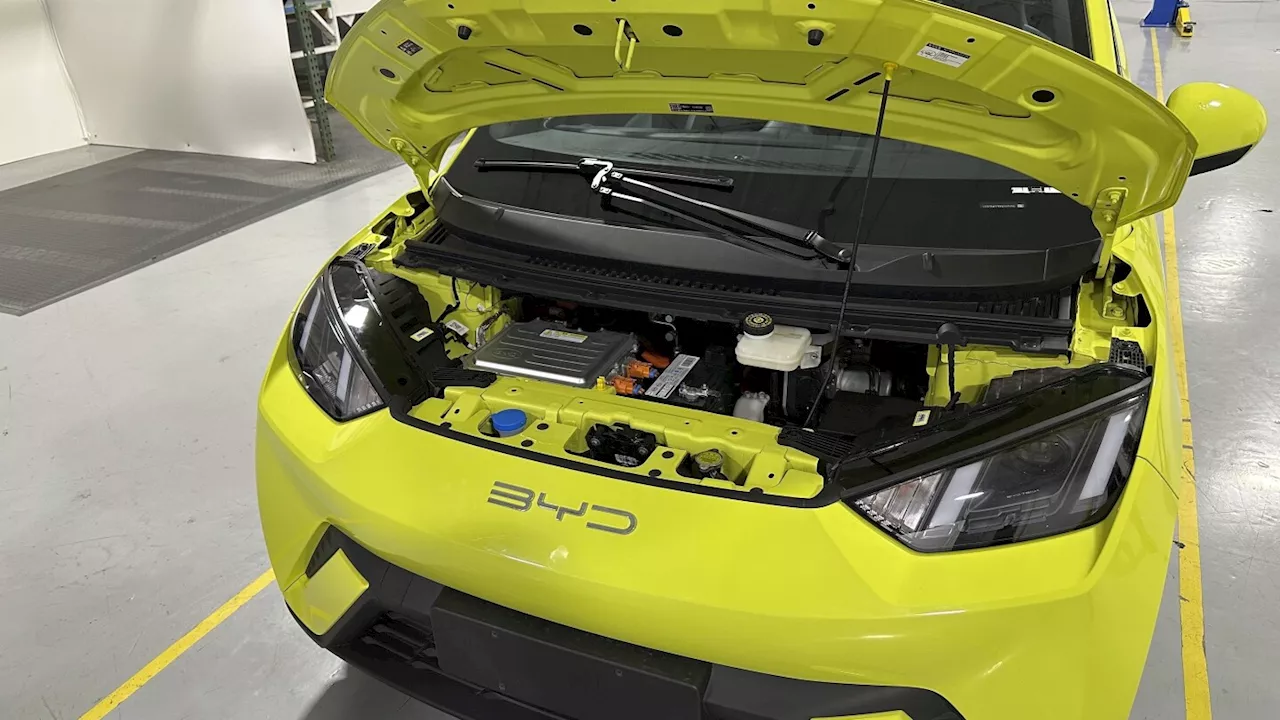 Prospect of low-priced Chinese EVs reaching US from Mexico poses threat to automakersAmerica’s auto industry has grown concerned that Chinese carmakers may be preparing to set up shop in Mexico to exploit North American trade rules. The Chinese could then send ultra-low-priced electric vehicles streaming into the United States, devastating the U.S.
Prospect of low-priced Chinese EVs reaching US from Mexico poses threat to automakersAmerica’s auto industry has grown concerned that Chinese carmakers may be preparing to set up shop in Mexico to exploit North American trade rules. The Chinese could then send ultra-low-priced electric vehicles streaming into the United States, devastating the U.S.
Read more »
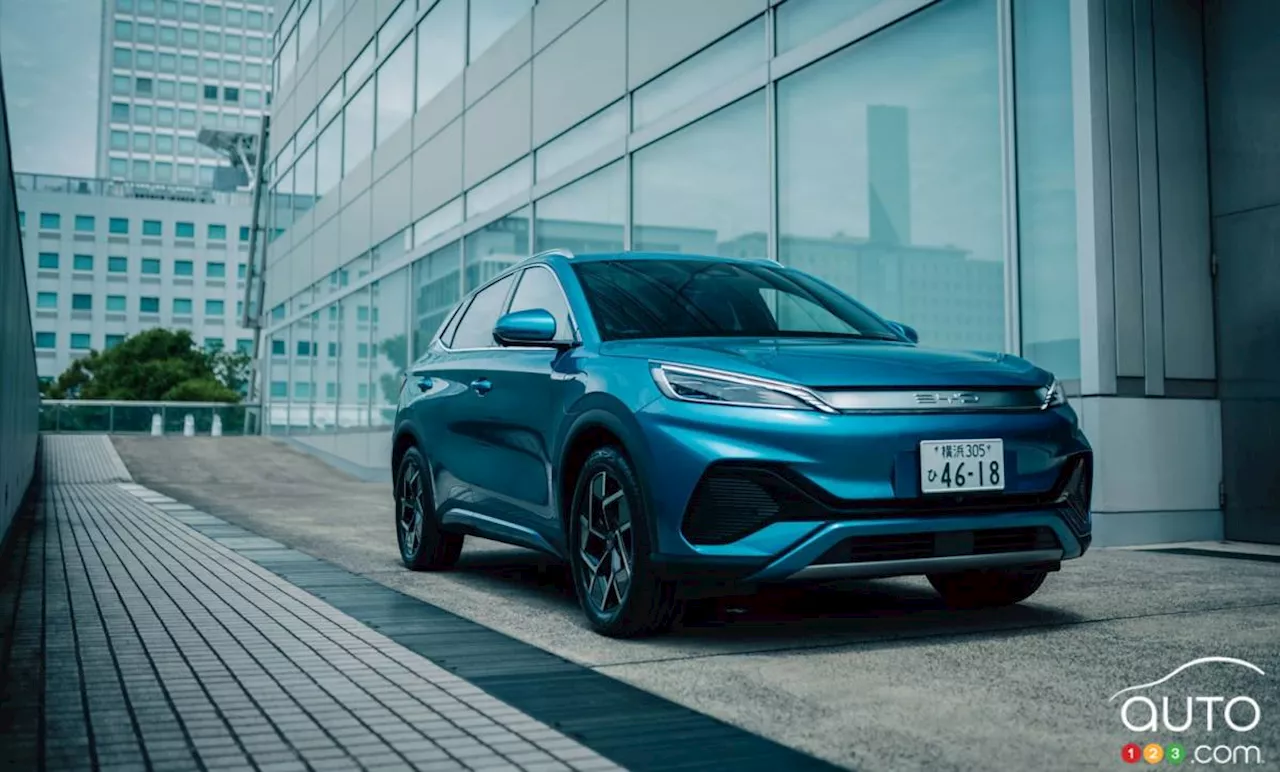 Canada launches consultation on tariffs on Chinese EVs | Car NewsCanada launches consultations on the possibility of increasing tariffs on imports of electric vehicles from China. Auto123 has more.
Canada launches consultation on tariffs on Chinese EVs | Car NewsCanada launches consultations on the possibility of increasing tariffs on imports of electric vehicles from China. Auto123 has more.
Read more »
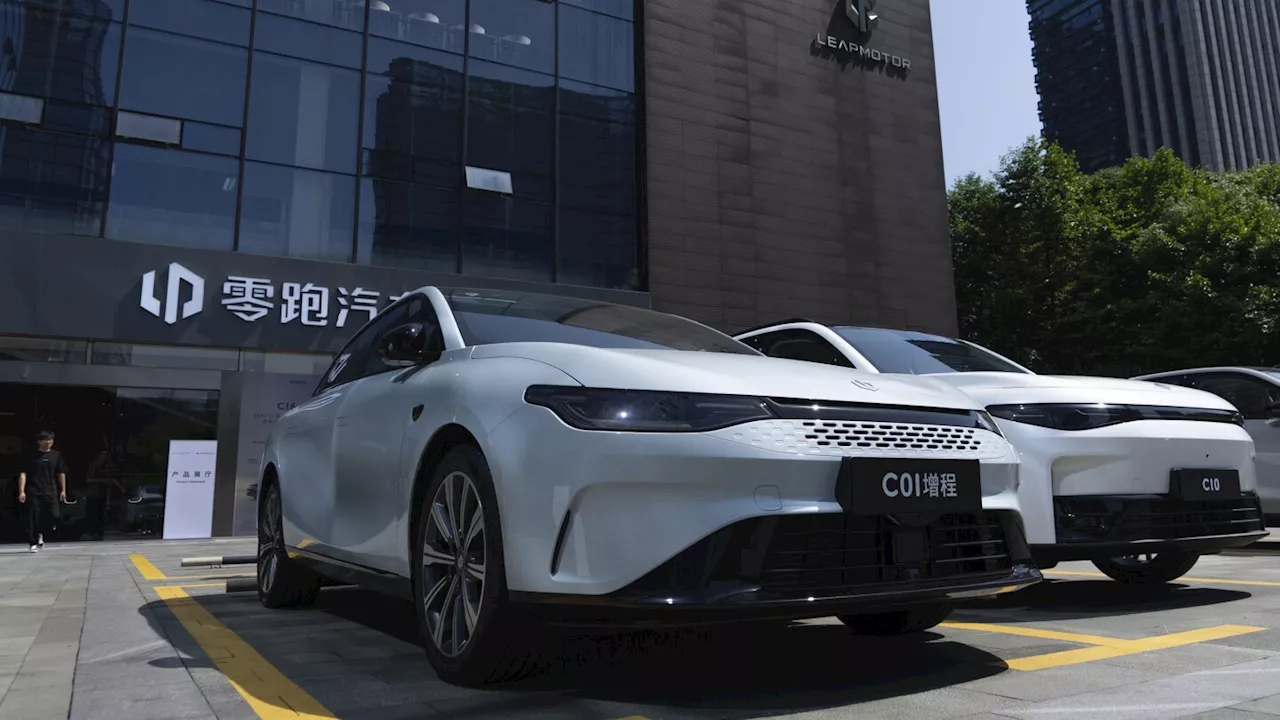 China and the EU are open to talks on plans to hike tariffs on Chinese EVsOfficials say that China and the European Union are open to holding talks on the EU's recent decision to sharply raise tariffs on imports of Chinese-made electric vehicles. China's Commerce Ministry and Germany's economy minister said over the weekend that each side was willing to hold talks on the issue.
China and the EU are open to talks on plans to hike tariffs on Chinese EVsOfficials say that China and the European Union are open to holding talks on the EU's recent decision to sharply raise tariffs on imports of Chinese-made electric vehicles. China's Commerce Ministry and Germany's economy minister said over the weekend that each side was willing to hold talks on the issue.
Read more »
 Canada studies whether to join U.S., EU and impose tariffs on Chinese EVsCanada begins a 30-day consultation on the issue after Deputy Prime Minister Chrystia Freeland said Monday there is a clear effort by Chinese companies to generate a global oversupply.
Canada studies whether to join U.S., EU and impose tariffs on Chinese EVsCanada begins a 30-day consultation on the issue after Deputy Prime Minister Chrystia Freeland said Monday there is a clear effort by Chinese companies to generate a global oversupply.
Read more »
 China, EU are open to talks on plans to hike tariffs on Chinese EVsOfficials say that China and the European Union are open to holding talks on the EU's recent decision to sharply raise tariffs on imports of Chinese-made electric vehicles
China, EU are open to talks on plans to hike tariffs on Chinese EVsOfficials say that China and the European Union are open to holding talks on the EU's recent decision to sharply raise tariffs on imports of Chinese-made electric vehicles
Read more »
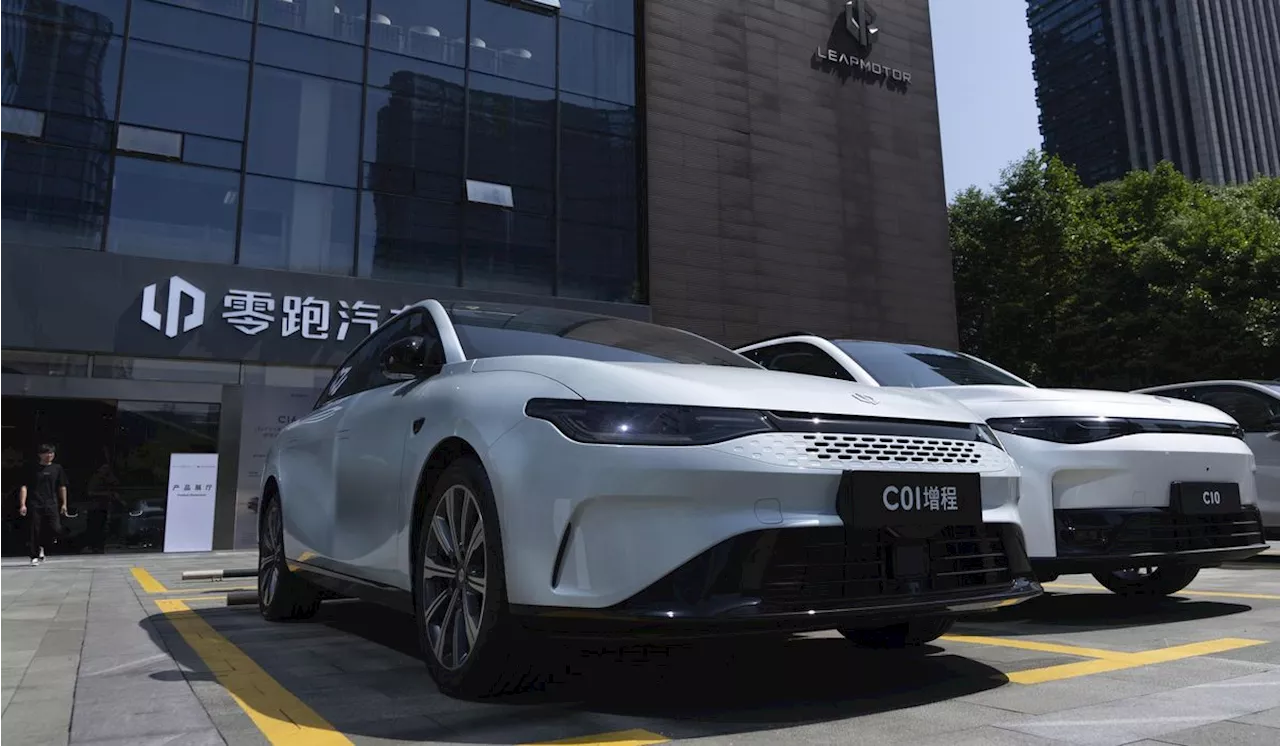 China, EU are open to hold talks on plans to hike tariffs on Chinese EVsChina and the European Union are open to holding talks on the EU's recent decision to sharply raise tariffs on imports of Chinese-made electric vehicles, officials from both sides say.
China, EU are open to hold talks on plans to hike tariffs on Chinese EVsChina and the European Union are open to holding talks on the EU's recent decision to sharply raise tariffs on imports of Chinese-made electric vehicles, officials from both sides say.
Read more »
